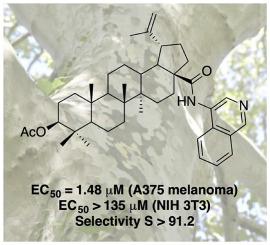European Journal of Medicinal Chemistry ( IF 6.7 ) Pub Date : 2020-09-09 , DOI: 10.1016/j.ejmech.2020.112815 Sophie Hoenke 1 , Niels V Heise 1 , Michael Kahnt 1 , Hans-Peter Deigner 2 , René Csuk 1

|
Betulinic and platanic acid derived amides were prepared and screened for their cytotoxic activity. All of the compounds were shown to be cytotoxic for a panel of human tumor cell lines, and especially apoptotic betulinic acid derived compounds 6, 8 and 19 showed low EC50 values. Of special interest was a 4-isoquinolinyl amide of 3-O-acetyl-betulinic acid (compound 19), being the most cytotoxic compound of this series and holding EC50 values as low as EC50 = 1.48 μM (A375 melanoma cells) while being significantly less cytotoxic for non-malignant fibroblasts NIH 3T3 with a selectivity index of > 91.2. This finding parallels previous results obtained for SAA21, a augustic acid derived compound thus making the 4-isoquinolinyl moiety to a privileged scaffold.
中文翻译:

桦木酸衍生的酰胺具有高度细胞毒性,凋亡和选择性。
制备了由Betulinic和platanic衍生的酰胺,并筛选了它们的细胞毒性活性。所有化合物显示出是细胞毒性对人肿瘤细胞系的面板,特别是细胞凋亡桦木酸衍生的化合物6,8和19显示出低的EC 50值。特别令人感兴趣的是3- O-乙酰基-贝丁酸的4-异喹啉基酰胺(化合物19),是该系列中最具细胞毒性的化合物,其EC 50值低至EC 50= 1.48μM(A375黑色素瘤细胞),而对非恶性成纤维细胞NIH 3T3的细胞毒性明显降低,选择性指数> 91.2。该发现与先前从SAA21(一种由奥古酸衍生的化合物)获得的结果相似,从而使4-异喹啉基部分成为了一种特殊的支架。


























 京公网安备 11010802027423号
京公网安备 11010802027423号